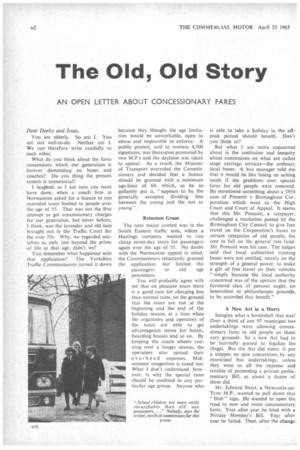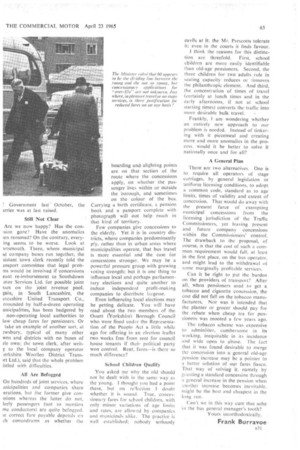The Old, Old Story
Page 64

Page 65

If you've noticed an error in this article please click here to report it so we can fix it.
AN OPEN LETTER ABOUT CONCESSIONARY FARES
Dear Darby and Joan.
You are elderly. So am 1. You are not well-to-do. Neither am 1. We can therefore write candidly to each other.
What do you think about the fares concessions which our generation is forever demanding on buses and coaches? Do you thing the present system is nonsensical?
laughed, as I am sure you must have done, when a coach firm in Normanton asked for a licence to run extended tours limited to people over the age of 55. That was not the first attempt to get concessionary charges for our generation, but never before, I think, was the lavender and old lace brought out in the Traffic Court for the over 55s. Why, we regarded ourselves as only just beyond the prime of life at that age, didn't we?
You remember what happened with that application? The Yorkshire Traffic Commissioners turned it down
because they thought the age limitation would be unworkable, open to abuse and impossible to enforce. A public protest, said to contain 4,500 signatures, was thereupon promoted by two M.P.s and the decision was taken to appeal. As a result, the Minister of Transport overruled the Commissioners and decided that a licence should be granted with a minimum age-limit of 60, which, as he so gallantly put it, "appears to be the generally accepted dividing line between the young and the not so young ".
Reluctant Grant
The next major contest was in the South Eastern traffic area, where a Hastings company wanted to run cheap seven-day tours for passengers again over the age of 55. No doubt with the Normanton appeal in mind, the Commissioners reluctantly granted the application, but limited the
passengers to old age pensioners.
You will probably agree with me that on pleasure tours there is a good case for charging less than normal rates, on the ground that the tours are run at the beginning and the end of the holiday season, at a time when the organizers and operators of the tours are able to get advantageous terms for hotels, boarding houses and so on. By keeping the coach wheels running over a longer season, the operators also spread their overhead expenses. Midsummer congestion is eased too. What I don't understand, however, is why the special rates should be confined to any particular age group. Anyone who is able to take a holiday in the offpeak period should benefit. Don't you think so?
But what I am more concerned about is the confusion and inequity about concessions on what are called stage carriage services—the ordinary local buses. A bus manager told me that it would be like losing an aching tooth if the problems over special fares for old people were removed. He mentioned something about a 1954 case of Prescott v Birmingham Corporation which went to the High Court and Court of Appeal. It seems that this Mr. Prescott, a ratepayer, challenged a resolution passed by the Birmingham City Council to give free travel on the Corporation's buses to certain categories of old people, the cost to fall on the general rate fund. Mr. Prescott won his case. The judges said that local authorities running buses were not entitled, merely on the strength of a general power, to make a gift of free travel on their vehicles "simply because the local authority concerned was of the opinion that the favoured class of persons ought, on benevolent or philanthropic grounds, to be accorded that benefit."
A New Act in a Hurry Imagine what a bombshell that was! Over a third of our 97 municipal bus undertakings were allowing concessionary fares to old people on those very grounds. So a new Act had to be hurriedly passed to legalize the illegal. But the Act did more: it put a stopper on new concessions by any municipal bus undertakings, unless they went to all the expense and trouble of promoting a private parliamentary Bill, as about a dozen of them did.
Mr. Edward Short, a Newcastle-onTyne M.P., wanted to pull down that " Halt " sign. He wanted to open the road to now and more concessionary fares. Year after year he tried with a Priliate Member's Bill. Year after year he failed. Then. after the change
Government last October, the irrier was at last raised.
Still Not Clear Are we now happy? Has the consion gone? Have the anomalies en removed? On the contrary, everying seems to be worse. Look at )rtsmouth. There, where municipal id company buses run together, the sistant town clerk recently told the ansport committee that legal probhis would be involved if concessions cant re-imbursement to Southdown otor Services Ltd. for possible joint sses on the joint revenue pool. gain, in South Lancashire, the incashire United Transport Co., rrounded by half-a-dozen operating unicipalities, has been badgered by non-operating local authorities to low cheap fares for pensioners. Or take an example of another sort, at .7.wsbury, typical of many other wns and districts with no buses of eir own; the town clerk, after writ; to the local company operator orkshire Woollen District Transal Ltd.), said that the whole problem istled with difficulties.
All Are Befogged On hundreds of joint services, where inicipalities and companies share erations, but the former give eoncsions whereas the latter do not. ierly passengers (not to mention me conductors) are quite befogged. le correct fare payable depends on :;11 conundrums as whether the
boarding an& alighting points are on that section of the route where the concessions apply, on whether the passenger lives within or outside the borough, and sometimes on the colour of the bus. Carrying a birth certificate, a pension book and a passport complete with photograph will mot help much in that kind of territory.
Few companies give concessions to the elderly. Yet it is in country districts, where companies predominantly ply, rather than in urban areas where municipalities operate, that bus travel is more essential and the case for concessions stronger. We may be a powerful pressure group with growing voting strength; but it is one thing to influence local and perhaps parliamentary elections and quite another to induce independent profit-making companies to distribute largesse.
Even influencing local elections may be getting delicate. You will have read about the two members of the Ossett (Yorkshire) Borough Council who were fined under the Representation of the People Act a little while ago for offering in an election leaflet two weeks free from rent for council house tenants if their political party won control. Rent, fares—is there so much difference?
School Children Qualify You asked me why the old should not be dealt with in the same way as the young. I thought you had a point there, but on reflection I doubt whether it is sound. True, concessionary fares for school children, with only minor variations of age limits and rates, are allowed by companies and municipals alike. The practice is well established; nobody seriously cavils at it; the Mr. Prescotts tolerate it: even in the courts it finds favour.
I think the reasons for this distinction are threefold. First, school children are more easily identifiable than old-age pensioners. Second, the three children for two adults yule in seating capacity reduces or emoves the philanthropic element. And third, the concentration of times of travel (certainly at lunch times and in the early afternoons, if not at school starting times) converts the traffic into more desirable bulk travel. s Frankly, I am, wondering whether an entirely new approach to our problem is needed. Instead of tinkering with it piecemeal and creating niore and more anomalies in the process, would it be better to solve it nationally once and for all?
A Ceneral Plan There are two alternatives. One is to require all operators of stage carriages, by general legislation or uniform licensing conditions, to adopt a common code, standard as to age limits, times of validity and extent of concession. That would do away with the present farce of exempting municipal concessions from the licensing jurisdiction of the Traffic Commissioners, yet leaving present and future company concessions within the Commissioners' control. The drawback to the proposal, of course, is that the cost of such a common requirement would fall, at least in the first place, on the bus operator, and might lead to the withdrawal of some marginally profitable services.
Can it be right to put the burden on the providers of transport? After all, when pensioners used to get a tobacco and cigarette concession, the cost did not fall on the tobacco manufacturers. Nor was it intended that the planter or grocer should pay for the rebate when cheap tea for pensioners was mooted a few years ago.
The tobacco scheme was expensive to adminis-ter, .cumbersome in its working, inequitable in its incidence
and wide open to abuse. the fact that it was found desirable to merge the concession intoa general old-age pension increase may be a pointer to a better solution of our fares fiasco. That way of solving it. namely by granting a standard concession through a general increase in the pension when another increase becomes inevitable, might be the best and cheapest in the long run.
Can't we in this way cure that ache in the bus general manager's tooth? Yours. unorthodoxically,
Frank Burravoe




































































































































